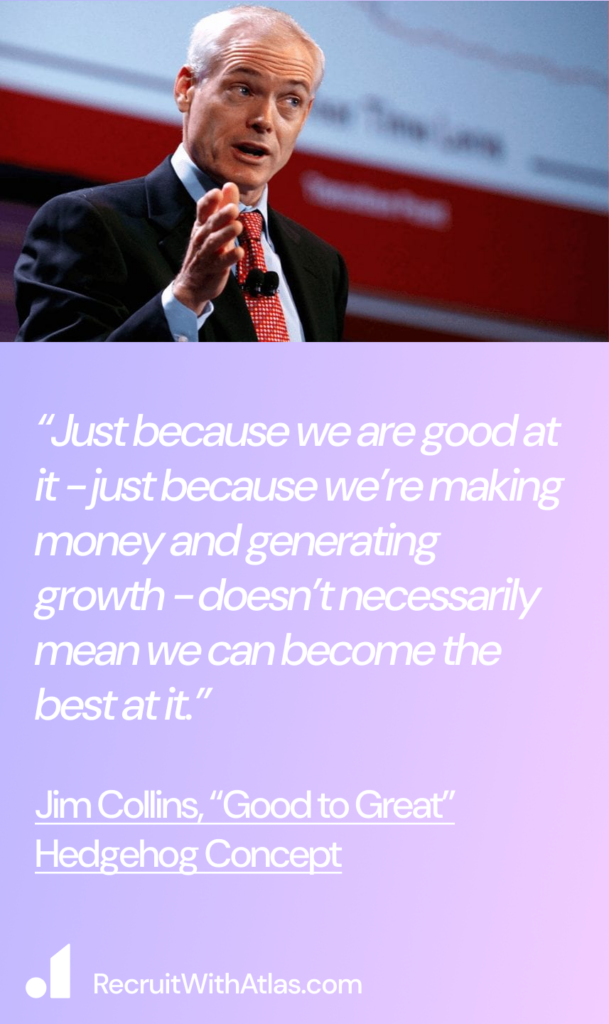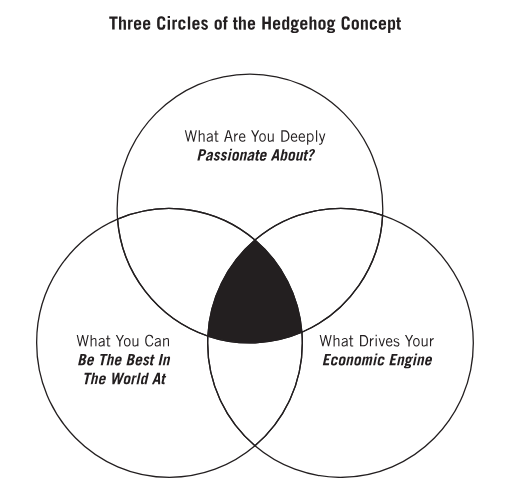
// Recruitment Technology, Executive Search Best Practices, Recruitment Strategies
10 Key Recruitment Skills for Executive Search Pros + Lessons From “Good to Great”
25/10/2024
9 MIN
In executive search, success isn’t just about placing candidates – it’s about mastering the right recruitment skills that set you apart in a competitive industry. To truly excel, you must go from good to great, focusing on continuous improvement and strategic thinking.
Drawing inspiration from Jim Collins’ renowned book Good to Great, which explores how companies make the leap to greatness, you can apply some of these timeless principles to your recruitment strategy.
Whether it’s cultivating deeper connections, AI recruitment tools, or sharpening your industry knowledge, these skills will empower you to not just survive but excel in the competitive landscape of executive recruitment.
Here’s how the right recruitment skills can transform your executive search practice, making both you and your team highly effective.

Here’s how the right recruitment skills can transform your executive search practice, making both you and your team highly effective.
10 Must-Have Recruitment Skills Backed by Jim Collins’ Insights
1. Relationship Building Skills
“Right People on the Bus” Philosophy – How can strong relationship building lead to executive search success
In executive search, trust is everything. High-level candidates are often passive and extremely selective, which means your ability to build strong, genuine relationships will determine your success. It’s not about quick wins, but rather long-term connections. You need to create a network of trust where candidates come to you because they value the relationship you’ve cultivated.
For example, keeping in touch with potential candidates regularly – even when there’s no immediate job on offer – can set you apart. A simple message checking in or sharing industry insights shows that you’re thinking of them, helping build rapport and keeping your agency top of mind.
Collins emphasises the importance of having the right people “on the bus” – meaning that success comes from building strong teams and relationships.
Similarly, as an executive recruiter, cultivating long-term, trust-based relationships with both candidates and clients is critical.
Great relationships ensure that the best candidates return to you for future opportunities and that clients trust you with their most critical hires.

2. Market Knowledge
Applying the “Hedgehog Concept” – Why market knowledge is key to thriving in executive recruitment
As an executive recruiter, you need to be an expert in your industry. Whether you specialise in technology, finance, or another sector, understanding the market is one of the most important recruitment skills you can develop. It’s about more than knowing job titles – you must be able to identify industry trends, understand the talent landscape, and advise your clients on what’s happening in their field.
For example, when speaking with a client about their hiring needs, you should be able to offer insights into what other companies are doing, where skills gaps exist, and how the market is evolving. This positions you as a strategic advisor, not just a recruiter.
Collins’ concept of the Hedgehog Concept – finding the intersection of what you’re passionate about, what drives your economic engine, and what you can be the best at – is highly relevant here.
To truly succeed, you need deep market knowledge in your niche. Being an expert not only makes you more effective but allows you to create more value for clients and candidates, positioning yourself as the go-to source for insights.

3. Emotional Intelligence (EQ)
Embody “Level 5 Leadership” – How emotional intelligence shapes effective executive recruitment
Executive search is as much about understanding people as it is about understanding business.
The best leaders, Collins writes, embody what he calls Level 5 Leadership, which is a blend of personal humility and professional will. This concept applies directly to emotional intelligence in recruitment. You need a high EQ to guide candidates and clients through sensitive negotiations, balancing empathy with the determination to achieve the best outcome for both parties.
Your emotional intelligence will be key in navigating the complexities of recruiting at the executive level. These candidates are often at the peak of their careers, with unique personal and professional considerations. High EQ allows you to understand and respond to their emotions, concerns, and motivations.
For example, if a candidate seems uncertain about a potential relocation, rather than pushing for a decision, you would use your emotional intelligence to explore their reservations and find a solution that aligns with both their personal and professional goals.
If you’re interested in the Level 5 Leadership concept, be sure to check out this playlist where Jim Collins answers your questions: Watch it here!.
4. Active Listening
Are you truly listening? The role of active listening and facing the “brutal facts” in recruitment success
Recruitment isn’t just about talking – it’s about having active listening skills. One of the most valuable recruitment skills you can have is the ability to actively listen, both to your clients and candidates. This means not just hearing what’s said but paying attention to the nuances and unspoken cues that can reveal a lot about a person’s true needs or concerns.
For instance, when meeting with a client, they may not explicitly state all of their concerns about the role or their organisation. By listening carefully, you can uncover deeper issues or challenges that they may not have openly discussed, allowing you to provide more tailored recruitment solutions.
Collins talks about the importance of facing the “brutal facts” while maintaining unwavering faith in your goals – active listening helps you gather those facts. By listening carefully to what both clients and candidates really want, you can build stronger, more transparent relationships, which is essential to success in executive search.
5. Negotiating Skills
Face Challenges Head-on – The art of balancing client and candidate needs
Negotiation is a critical part of executive search. Collins discusses the importance of confronting reality and dealing with challenges head-on. Strong negotiating skills help you do just that – balancing client needs with candidate expectations.
Whether you’re discussing salary packages, perks, or role expectations, you need to balance the needs of your client with the demands of top-tier candidates. Strong negotiation skills will allow you to facilitate conversations that result in mutually beneficial agreements.
For example, if a candidate is seeking a higher salary than your client is prepared to offer, you could suggest alternative incentives such as flexible working arrangements, bonuses, or career development opportunities that align with both parties’ interests.
6. Problem-Solving Abilities
Apply the Flywheel Concept to overcome challenges in executive search
Challenges are inevitable in executive search, and how you handle them can make or break a placement. The best recruiters are those who can think creatively and find solutions when obstacles arise. Problem-solving is one of the recruitment skills you need to develop in order to pivot quickly and keep the process moving forward.
For example, if you find that the candidates in your shortlist don’t have the niche regulatory expertise your client requires, you could look for talent in adjacent industries or explore candidates with similar transferable skills, ensuring the search stays on track.
Collins’ Flywheel Concept – where momentum builds slowly and steadily over time – reflects the importance of solving small problems to create larger successes.
In executive search, each problem you solve, whether it’s a last-minute candidate dropout or a challenging client brief, contributes to building your overall success and reputation.
If you want to learn more about these powerful concepts from Jim Collins and see how they can change the way you approach executive search, take a look at this great monograph.
7. Time Management
Discipline in Action – How time management tools can streamline your recruitment process
In executive search, time management is crucial as you juggle clients, candidates, and interviews. A major takeaway from Good to Great is the idea of disciplined thought and action.
Great companies and people, Collins says, stay focused on what matters most.
To channel your efforts toward big-picture goals, tools like our AI-powered platform can take on your time consuming tasks – from candidate sourcing, personalising outreach, interview note taking, to scheduling.
- Advanced filters and a powerful search feature make it easy to identify top candidates fast.
- With Interview AI capturing insights in real time, retrieving key points is effortless.
- You can also conduct candidate and client outreach at scale with the new Chrome extension, which lets you add candidates to messaging sequences in real time and edit them as needed.
- You can ask questions about candidates and pull information from your team’s shared knowledge base
- You can also create custom, multi-step outreach campaigns across multiple channels, helping you manage outreach efficiently, boost response rates, and turn hours of work into just minutes.
All these tasks can take up a lot of time, which is why using platforms like Atlas to manage them can help you and your team to really focus on the high impact work that brings real value to your business. If you want to see how Atlas can work for you business, give it a go!
8. Sales Savvy
Adopt a Culture of Discipline – How to sell roles and build client trust
The executive recruitment process is, at its core, about sales. You are selling opportunities to candidates and your services to clients. To stand out, you must develop sales skills that allow you to pitch your value effectively, whether it’s when engaging a new client or enticing a top candidate to explore a role.
Sales skills are essential in recruitment, and Collins’ Culture of Discipline applies directly here. Successful recruiters bring a disciplined approach to selling – whether it’s selling a role to a candidate or pitching your services to a client. Rather than relying on luck, you need a systematic approach to engaging, nurturing, and closing deals.
For instance, when pitching your agency to a new client, don’t just talk about the number of placements you’ve made. Highlight the value you bring – market insights, a targeted search process, and your ability to find hard-to-reach candidates.
By positioning yourself this way, you’re not only offering services but also actively engaging in their goals and challenges, working collaboratively to find the best solutions. This approach fosters trust and strengthens relationships, making you an integral part of their journey rather than just another vendor.
9. Resilience and Grit
The Stockdale Paradox – Why resilience and grit are essential traits for executive recruiters
Executive search can be tough. Candidates will drop out, clients may change their requirements, and there will be times when placements fall through. Resilience is one of the recruitment skills that will help you push through these challenges and come out stronger.
For example, if a candidate pulls out at the last minute, don’t let it derail the process. Quickly revisit your talent pool, engage with other promising candidates, and maintain a positive outlook – this will allow you to stay agile and focused on finding the right solution.
Collins talks about The Stockdale Paradox, which involves confronting harsh realities while maintaining faith in your eventual success. In executive search, resilience is key. Even when candidates pull out or clients change their minds, maintaining a positive mindset and pushing forward ensures long-term success.
10. Tech-Savviness
Use technology as an accelerator – How AI recruitment platforms are transforming executive search
In the hectic world of recruitment these days, being tech-savvy gives you a distinct competitive edge and is essential for going from good to great in executive search.
Collins’ concept of technology as an accelerator is all about using the right tools to enhance your capabilities and drive meaningful outcomes.
In the context of recruitment, platforms like Atlas embody this idea by simplifying your workflow. Instead of juggling multiple systems, you can manage both clients and candidates in one place.
The impact of using a recruitment platform like Atlas goes beyond just saving time. By automating repetitive tasks, you free yourself up to focus on high-impact activities, such as building relationships and crafting tailored strategies for your clients. This shift in focus can lead to better client satisfaction and more successful placements.
Using technology as an accelerator is important today. It gives you the tools to adapt quickly, respond to market demands, and ultimately drive results.
Final Thoughts on Your Path to Success in Executive Search
As an agency owner, mastering these recruitment skills can help you take your executive search business to the next level. It’s not just about placing candidates – it’s about becoming a trusted partner to your clients and a go-to executive search recruiter for top-level positions.
By focusing on these 10 essential recruitment skills – and applying the lessons from Good to Great – you can transform your executive search business from simply good to truly great.
Whether it’s building stronger relationships, using AI recruitment technology, or honing your market expertise, these skills will help you not only survive but thrive in the competitive world of executive recruitment.
Collins’ insights remind us that technology isn’t just about keeping up, it’s about getting ahead. With platforms like Atlas, you’re not just keeping pace with the industry – you’re setting the bar for excellence in recruitment.
In the end, this approach will help you build a reputation as an expert in your field, strengthen your relationships, and grow a successful agency that both clients and candidates can rely on.








